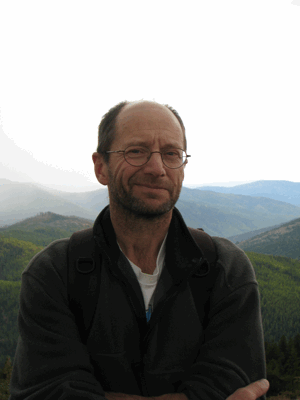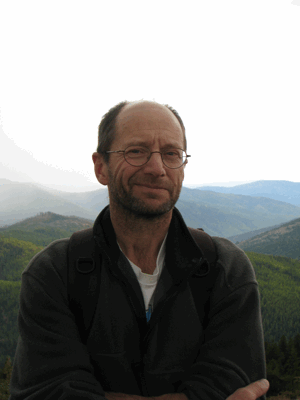Spring's A Comin'
Air Date: Week of March 12, 2010

Rick Bass (Courtesy of Rick Bass)
It's been a long winter for Montana writer Rick Bass. But now, in March, he's finally seeing signs that spring is near.
Transcript
BASS: The marsh is still a mottled slab of snow and ice, but with a few standing puddles of water.
YOUNG: In northern Montana, writer Rick Bass sees signs that spring is near.
BASS: The once opaque ice is thinning now to silver green hues of translucence.
The heavier, sturdier birds are returning first – the powerful ducks and geese, birds flying across the top of the forest each night, returning like rising water levels themselves, hurrying to fill the new spaces created by the snow’s departure.
The snow is not yet going away for good. But the struggle has begun in earnest – the land rush is on – and as the snow and ice begin to disappear, the ducks and geese are claiming the new water, pothole by pothole, wing-splash by wing-splash.
By mid-March, they are pouring in like bats. Their unseen wing-whistling is heard always at dusk, so that it seems to me as if with their enthusiastic return they are helping to nudge along the advancing equinox – the return of enough light, finally, to balance the dark.

(Courtesy of Rick Bass)
It’s still cold and snowy, but somewhere – if not yet on the marsh – there’s one more new slot of open water, just ahead, just-opened; and they’re anxious, it seems, to be the first to reach it. Perhaps in their power and rush they are not just moving us toward the equinox, but are in fact attempting, with their momentum and desire, to speed it along. It’s easy to imagine that with their fast strong flights they are finally pulling back the covers off winter, finally revealing the bare, black earth of spring, and the coming meadows and marshes that will one day be as brilliantly green as the jeweled feathers on the heads of the mallard drakes that are now re-inhabiting them.
You can’t see any of this, at night, nor into the future. But it’s up there, and out there – close enough to hear, if not quite yet see. Whispered promises, now. Pulling my youngest daughter, Lowry, on her sled across the crust of vanishing marsh ice, skirting around the shallow puddles – each day seems to be the last day, then the last hour, I can do this. The trail, the wake, of our fractured ice glints and glitters like a path of diamonds. It seems to me that it is the thunderous, rasping noise of the steel runners themselves, the tympanic rumbling that will urge the spring along, as much as the whistle of duck wings at night. So much noise: as if these rasps and rumblings, and even her delighted laugh, are what will awaken the sleeping season.
YOUNG: Writer Rick Bass lives in the Yaak Valley near Troy, Montana. His novel, Nashville Chrome, will be published this fall.
Links
Living on Earth wants to hear from you!
Living on Earth
62 Calef Highway, Suite 212
Lee, NH 03861
Telephone: 617-287-4121
E-mail: comments@loe.org
Newsletter [Click here]
Donate to Living on Earth!
Living on Earth is an independent media program and relies entirely on contributions from listeners and institutions supporting public service. Please donate now to preserve an independent environmental voice.
NewsletterLiving on Earth offers a weekly delivery of the show's rundown to your mailbox. Sign up for our newsletter today!
 Sailors For The Sea: Be the change you want to sea.
Sailors For The Sea: Be the change you want to sea.
 The Grantham Foundation for the Protection of the Environment: Committed to protecting and improving the health of the global environment.
The Grantham Foundation for the Protection of the Environment: Committed to protecting and improving the health of the global environment.
 Contribute to Living on Earth and receive, as our gift to you, an archival print of one of Mark Seth Lender's extraordinary wildlife photographs. Follow the link to see Mark's current collection of photographs.
Contribute to Living on Earth and receive, as our gift to you, an archival print of one of Mark Seth Lender's extraordinary wildlife photographs. Follow the link to see Mark's current collection of photographs.
 Buy a signed copy of Mark Seth Lender's book Smeagull the Seagull & support Living on Earth
Buy a signed copy of Mark Seth Lender's book Smeagull the Seagull & support Living on Earth

